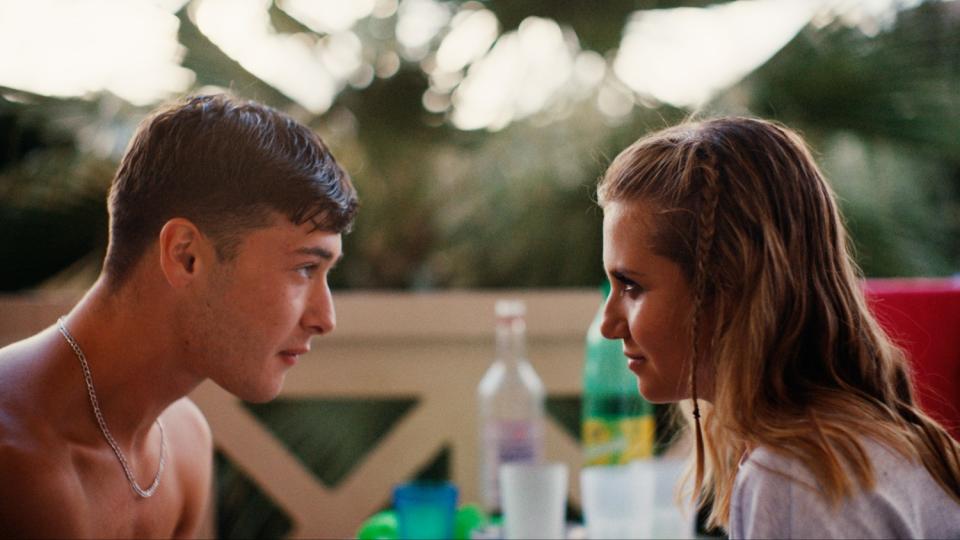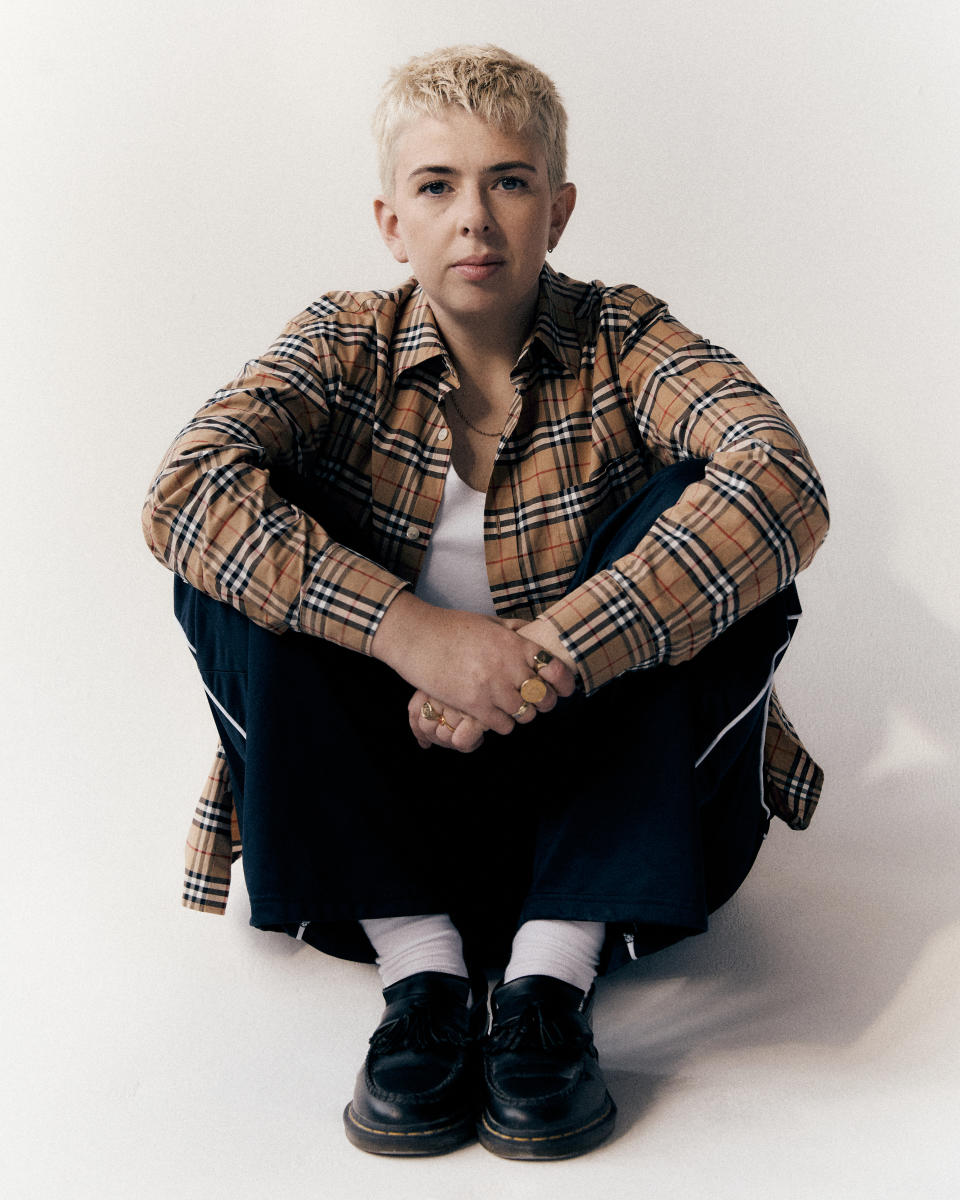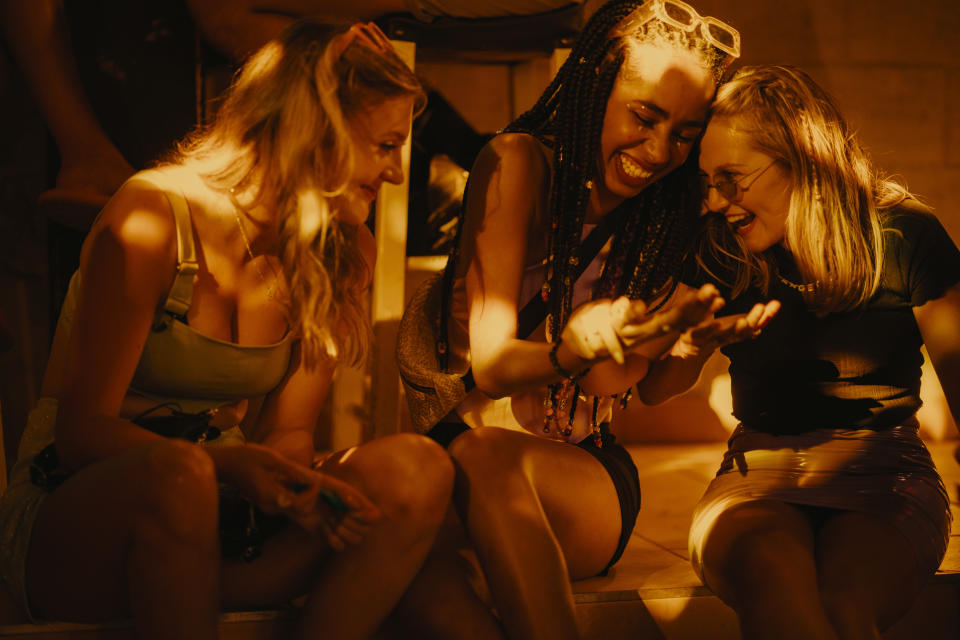How to Have Sex Director Molly Manning Walker On Unblurring the Lines of Consent

- Oops!Something went wrong.Please try again later.
- Oops!Something went wrong.Please try again later.
- Oops!Something went wrong.Please try again later.
<em>How to Have Sex</em>: Tara, portrayed by Mia McKenna-Bruce, is at the center of the story which spotlights consent and agency through the experience of a teenage girl. Credit - Courtesy of MUBI
Warning: This post contains spoilers for the movie How to Have Sex
Sometimes the loudest screams are silent, and that’s just one of the startling realities of life and girlhood which How to Have Sex explores. The film introduces us to Tara (Mia McKenna-Bruce), who has gone on vacation from England to Malia—a party destination in Greece, favored among Brits—with her two best friends, Skye (Lara Peake) and Em (Enva Lewis). The 16-year-old schoolgirls are determined to have the “best holiday ever” and within seconds of arriving, the goals of the trip are laid out, with drinking, smoking, and partying taking precedence. But the elation of being the masters of their own universe soon wears off, as the girls find themselves ill-equipped to deal with the challenges they face.
The feature directorial debut from writer-director Molly Manning Walker, which won the Un Certain Regard award at the 2023 Cannes Film Festival and released in the U.K. last year ahead of its Feb. 2 U.S. release, unapologetically explores the joy, terror, and resilience of navigating your formative years. Tara is feeling pressured to lose her virginity, largely by Skye, whose qualities as a friend quickly come into question. Apprehension hangs in the air, as the girls await the results of their end-of-year exams, which will determine which schools they can attend. The excitement of an “anything can happen”-style holiday is paired with the crippling fear of what the future holds post-Malia. The girls become fast friends with a mixed group of young adults in the room opposite theirs, among them two guys, Paddy (Sam Bottomley) and Badger (Shaun Thomas). Eager to appear more mature, they lie about their ages, tacking on a critical couple of years.
Two pivotal scenes tackle the “how to have sex” premise of the film, each depicting sexual encounters whereby enthusiastic, positive consent is glaringly absent. Yet, as Walker tells me when we meet, those scenes have been hotly debated and deconstructed among audiences, with some viewers failing to recognize either scenario as assault. That discord reflects a major motivation behind Walker’s effort to bring this drama to audiences.
Read more: The Most Anticipated Movies of 2024
From those debates to discussions sparked in classrooms, How to Have Sex has made an impact far and wide. It’s been a whirlwind experience for Walker, 30, who served as the director of photography on another British breakthrough film in 2023, Charlotte Regan’s Scrapper. Cementing the success of her first feature film, London-born Walker is nominated for the Outstanding Debut by a British Writer, Director or Producer award at this year’s BAFTAs.
On my first meeting with Walker last year (a brief introduction at the U.K. premiere of Poor Things) she told me she was apprehensive about how the British film would translate to U.S. audiences. When we met in January at The Soho Hotel in London shortly after the film had made its stateside debut at Sundance, her concerns had somewhat abated. “The reaction was amazing, the room was really buzzy,” Walker says. “The ‘Me Too’ movement has been massive there, so there was a lot of intrigue about the conversation. Also, they really got the humor, which is cool, as I had kind of thought it might not land.” Although How to Have Sex is undoubtedly a British drama, the themes it explores are universal, so it’s unsurprising that the message has, so far, translated across the Atlantic.
Ahead of the film’s U.S. release, Walker discussed the nuances of her coming-of-age drama, and how in tackling the topic of consent, she has aimed to give a voice to those often rendered voiceless.
This interview has been condensed and edited for clarity.
TIME: This film has evoked such profound reactions from audiences. I know it sparked many conversations within my own friendship circle. Tell me about the responses you have encountered, firstly from women, but also from men.
Walker: We hoped that women would feel seen by the film, but we didn’t realize the magnitude of it. It became apparent quite quickly that most women were having a strong reaction to it. What’s been really shocking to me, and what I hadn’t realized, is that men have been recognizing their own behavior in it. After one of the Cannes showings, an older guy—he was about 70, maybe even older—was pacing outside the screening. We were like, “Are you alright?” and he said, “I’ve just realized that I’ve been Paddy.” Those are the reactions that feel really radical.
As women, we’re always having these conversations about consent and assault, but it’s not something we hear men being so vocal about. How has that dialogue been going so far?
I think this film holds a mirror up to whoever’s watching it. After Cannes, I had two days of gnarly press. Lots of men were like, “Well why didn’t she [Tara] get out of the bed?” or “I don’t understand why she didn’t just say ‘no.’” It just reflected how that person feels about the world. But recently we had a group of men, who were quite laddy, say: “I think we need to be better and we need to talk about this more.” One of them even said, “I’m going to go to therapy, because I think I’ve been in this situation before and I need to talk about it with someone.” So it has started to change things slightly.

The “no” comment is enlightening. Tara said “no” to going into the sea, yet Paddy lifted her and dunked her into the water, anyway. So that was her first “no,” which I—and no doubt many others—recognized straight away.
Yes! It’s like, “no, no, no” then she’s on the beach under him and pressured, and then (says) “yeah.” It’s interesting, because we’ve been working with this charity called The Schools Consent Project, and we’ve been taking the film into classrooms. That’s probably been the most emotional part of the journey for me. The film is being used as a tool to discuss consent. The last time I attended, two kids in the class said, “Neither of these were assaults. These are normal.” And then, these male teenagers at the back of the class said, “Listen, mate, this is why it’s an assault.” They were teaching each other, but not in an aggressive way. It was done with such compassion. I thought, “Wow.”
In 2020, you released a short film called Good Thanks, You? which follows the aftermath of a sexual assault, and how the trauma often continues due to the failures of authorities that become involved. Why did you choose the lens of a girls’ holiday as a vehicle to explore these themes in How to Have Sex?
I was assaulted when I was 16. It was a very different assault—quite violent and in London. Once I’d made Good Thanks, You? there was a huge outpour of people telling me their own stories. And I thought, “How many of my sexual experiences were consensual?” The assault aside, at what point did I learn what good sex was? It was so late for me. So I wanted to break down the culture of sex, how we teach each other, and what situations we think are good at that time [of teenhood].
Was it ever overwhelming writing something of this nature, because of your own experience?
Yeah, definitely. Although less so in the writing, because it was so detached from my own experience, I felt I could sort of put it over there. But I think, and not in this case, lots of press have been quite aggressive. Trying to catch you on the backfoot. You sit down to do a TV interview and they’ll say: “You were assaulted. Tell us about the assault.”
Even the other day, someone was like, “Let’s get into the details of it” and I was like, “Let’s not.” I’m open and happy to talk about the fact that it happened… but don’t do that on live TV. That’s been the most complicated bit for me.
I wanted to talk about the male gaze vs. the female gaze. In this film, there isn’t really any nudity. During the first assault, there’s an intimate focus on Tara’s face, and we see her hand clenching the sand. The female gaze here is so necessary. Is that something you had noticed was absent elsewhere and was it a concerted effort on your part to ensure this film had it?
It was definitely conscious. I felt that films which talked about assault were either hypersexualized or overly traumatic. As women, especially, we don’t need to be retraumatized in a graphic way. For me, it’s more interesting to feel her emotion and see what she’s going through via her face. So the plan was to always shoot her face, and then you feel what’s happening around her, but you don’t need to be super graphic. Not to compare this film to an alien movie [laughs] but when you see the alien, you think, “Ah, that’s not scary!” but feeling it and not seeing it is way more upsetting.
In that beach scene, we didn’t even shoot Sam (Paddy), because it’s not about him. It’s not about what he’s going through. It’s about how Tara feels in that moment.

You had an intimacy coordinator, Jenefer Odell, working on this project. Talk me through that collaboration. Did you choreograph the Tara and Paddy scenes?
I storyboarded the whole thing by hand, and then we shot photographs of the scene. We choreographed it together. Those scenes were probably the most planned out of the film. We rehearsed the beach scene in the hotel, and then we took it to the beach and blocked it through. The beach scene, especially, knowing that it was a public place, then us having to get the actors dry and then wet, then dry and then wet. It was a long scene and we were shooting in the middle of the night in the winter. It was very technical. The actors [were involved] as well, because they had an opinion on how it should be.
There needs to be that barrier of protection, especially for young actors. Interestingly, I think the guys struggled with it more. Both the crew and the actors, because for the first time, they were seeing it from a female perspective. Whereas a lot of women watch that beach scene and go, “Isn’t that normal?” Which is so scary and sad.
It’s eye-opening to learn how the beach scene impacted people behind the scenes and during early screenings.
It became a thing in the edit. The beach scene wasn’t originally a flashback. But we realized people weren’t finding it shocking. People were finding it normal. So we took that bit [the sexual act] and moved it later, to show it’s not OK and that she’s still thinking about it.
Read more: The Director of Fair Play Breaks Down Those Sex Scenes
Let’s discuss Badger for a moment. On my first viewing of the film, and this seems simple now, but I thought of him as “the good guy” and Paddy as “the bad guy.” Then upon my second watch, I noticed several instances where Badger could have spoken up for Tara. He doesn’t know what’s happened, but he knows something has, yet he doesn’t say anything. Was that another teachable moment you intentionally included in the film?
Often, people say, “We love Badger!” and I reply “Do we? Do we totally love Badger?” [Laughs] We really wanted men to recognize themselves in the film. And it’s quite difficult, although it has been done, to recognize yourself in Paddy. But it’s hopefully easier to recognize yourself in Badger. He thinks he’s kind of a tough guy, he’s funny, and sweet. But he still fails her in so many ways. So many people have said, “It’s so sweet when he puts her to bed and doesn’t have sex with her.” And I’m like, “If that’s what we’re crediting the good guys with, then we have such a long way to go.” So the plan was that he kind of fails her.
Last year was often called “The Year of the Girl.” There were references to “girl math” and “girl dinner” across social media. Major pop culture moments such as Barbie put girlhood at the forefront of the conversation. For girls, the coming-of-age transition encompasses joy, confusion, peer pressure, and everything in between. How did you approach girlhood going into this film?
I was interested in why we were so nasty to each other, but with it buried in being the best time of our lives. We were all figuring it out and pretending at some point. But yeah, it was a reflection of what I thought was friendship and what I recognize now as friendship.

I’m eager to hear your thoughts on the relationship between the three main girls, specifically that between Tara and Skye. Skye reminded me of a girl at school who said she wasn’t going to do the homework, with the implication that no one else should do it, but then she’d turn up to class having done it.
That was one of the key things for Skye! We wrote bios for everyone and “secret reviser” was in hers. It’s a powerplay. Skye is as damaged, if not more so, as Tara. She has low confidence and needs to be appreciated and loved by everyone, yet she’s not getting it, and she’s likely not getting it at home, either.
The friendship group was always designed in a triangle, so that two of them would be closer in some scenes, which would always leave one person out. It was this push and pull of who was the closest at any one point. It’s about what that dynamic does.
The ending of the film is powerful, yet understated. Tara has vocalized what happened to her. The holiday is over and she’s been irrevocably changed. When she runs toward the plane at the end, hand in hand with Em, she smiles and yells, “We’re coming home.” It’s such a resilient, freeing note to end on. What made you sign off like that?
Firstly, I think women are very resilient. Lots of men have seen the ending of the film and said, “Well, if she’s so upset about being assaulted, why does she just run away with happiness at the end?” But she’s not happy. She’s just carrying on, like the rest of us. I think there’s a type of victim that we’ve seen on screen or we think of in real life which is the meek, sensitive soul. Which it [assault] also does happen to, obviously, but the bolshie girl that walks into the room has still probably been assaulted. I wanted to end it on a note that we all carry on, we all keep going, and it still happened to us. It doesn’t mean we’re not affected by it.
As for what happens after the film signs off, what takeaway do you want to leave audiences with?
To be kinder to each other in general. As you said, the pressure comes from all angles in this film. From friendship, environment, and toxic masculinity. If we were all kinder and spoke about things more openly with each other, about consent and everything, then the world would be a better place.
If you or someone you know has been the victim of sexual assault, you can find help and resources at rainn.org.
Write to Olivia-Anne Cleary at olivia-anne.cleary@time.com.

